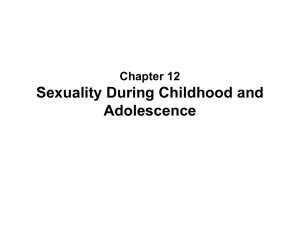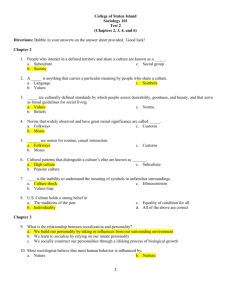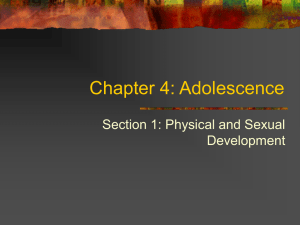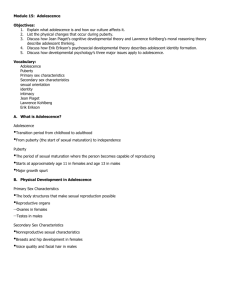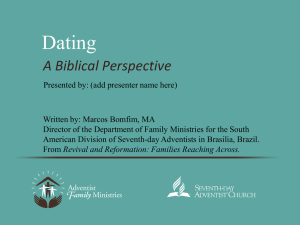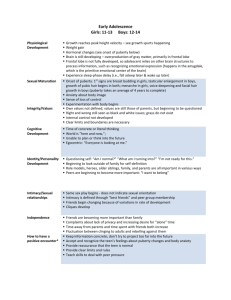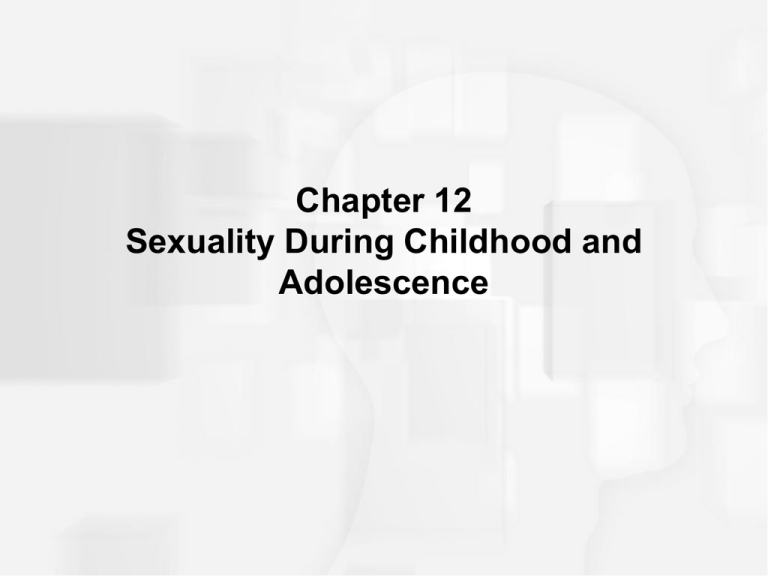
Chapter 12
Sexuality During Childhood and
Adolescence
Infant and Childhood Sexuality
• Capacity for sexual response present at birth
• Infants engage in self-pleasuring activity
• Unable to differentiate sexual from sensual
pleasure
• Sexual behavior is a normal part of development
Childhood Impacts Adulthood
• Many experiences of this time have great impact on
future expression of adult sexuality
• Child is rarely touched and held during the first few
months and years of life
– The person would be more likely to have difficulty
establishing intimate relationships.
• Know information from the study of normative
sexual behavior in children
Masturbation in Adolescence
• Increase in frequency and numbers
• Safe sexual release
• Way to learn about self
Non-Coital Sexual Expression
in Adolescence
• Kissing, holding, touching, manual & oral
stimulation of genitals
• Oral-genital activity has increased
• Learning about sexual intimacy
• Can technically stay a virgin
– Problems with this definition?
Ongoing Sexual Relationships
During Adolescence
• More common at this age than in past
• Narrowing of gender gap
– Girls less likely to “save themselves” for
marriage
– Boys more likely to want an affectionate
relationship
Reasons for Sexual Intercourse During
Adolescence
• Acceleration of sex hormones
• Curiosity & readiness
• Affection for partner
• Push to adult behavior
• Peer pressure, date pressure
Same-Sex Experiences in Adolescence
• Experimental or transitory same-sex sexual
contact between peers is common
• Some individuals begin to self-identify as
lesbian, gay, and bisexual in teen years
• Often encounter negative societal reactions
• Reconciling orientation can be difficult; often
rejection by peers and family
U.S. Teen Pregnancy Rates
• U.S. has highest teen pregnancy rates in
Western world
• 1 in 5 sexually active teens becomes pregnant
each year
• Impact of Pregnancy
– Teen mother and baby’s physical health
– SES and education
– Quality of parenting
Teens Less Likely than Adults to use Birth
Control Correctly
•
•
•
•
•
•
•
Lack of adequate knowledge
Planning ahead implies loose morals
Fear of pelvic exam
Embarrassment
Confidentiality concerns
Less stable relationships
Difficulty communicating with partner
Strategies to Reduce Teen Pregnancy
• Free, confidential contraceptive services
• Compulsory national sex-education
• Focus on shared responsibility for BC
• Relax governmental restrictions
School Based Sex Education
Answering Children’s Questions
• Quality of programming varies
• Most parents support such programs
• Abstinence based programs do not delay first
intercourse or affect attitudes about sex
• Research shows that sex education programs
do not increase sexual experimentation nor
restraint, but they do decrease high-risk
behavior


